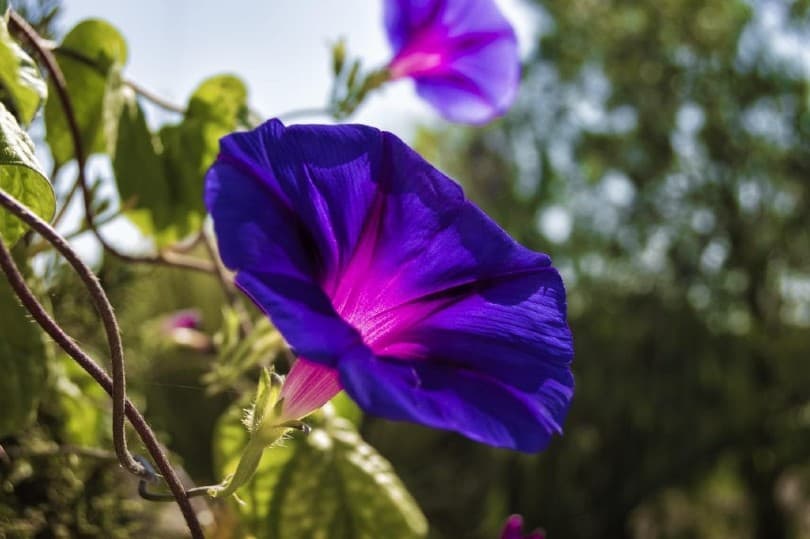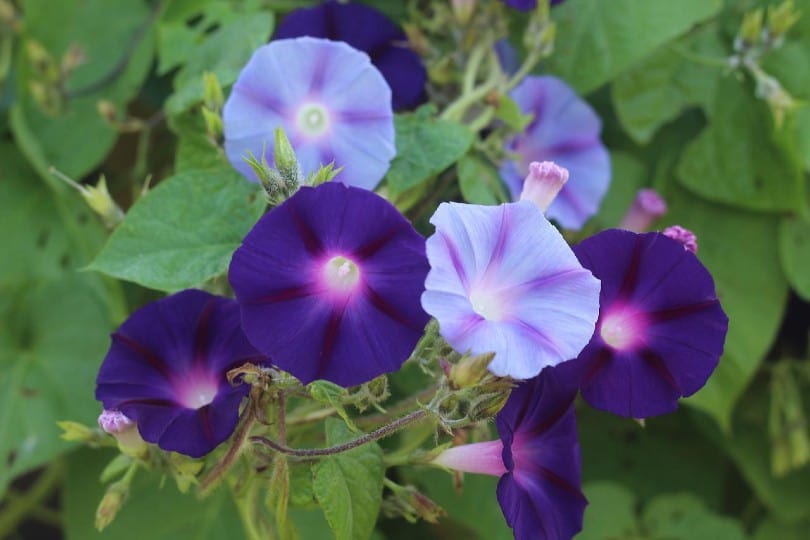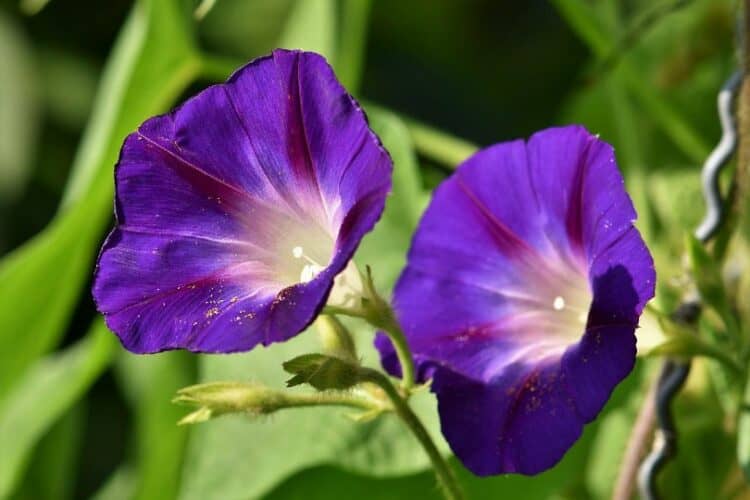The gorgeous morning glory gets its name from the fact that it unfurls its beautiful petals in the morning. These flowers are a delight to grow and appreciate overall, and they are popular among gardeners. However, there is a problem with morning glories: They are quite toxic to dogs.
Here, we look at what makes the morning glory so toxic to pets and what steps you need to take if your dog eats any.
What Are Morning Glories?
Morning glories are perennial flowering vines that are in the same botanical family as sweet potatoes. However, they are not edible like sweet potatoes, as they are toxic for us and our pets.
They bloom trumpet-shaped flowers that are purple, white, blue, and pink. They have a light fragrance, and the combination of the shape of their brightly colored flowers makes them a favorite for hummingbirds and butterflies.
They are native to Central America and Mexico and are quite easy to grow. You just need a trellis for them to climb up, and they don’t need pruning or deadheading.
But for all their beauty, there is a dark side: their toxicity.

Why Are Morning Glories Toxic?
The Pet Poison Helpline and the ASPCA have both classified the morning glory as toxic to pets. All parts of the plant should be avoided, but the seeds are the true danger.
The seeds from certain morning glory species contain lysergic alkaloids, which are toxins. When a large number of seeds are ingested, they can cause:
- Incoordination
- Staggering
- Nausea
- Diarrhea
- Loss of appetite
- Agitation
- Hallucinations
- Tremors
- Confusion
- Loss of appetite
- Dilated pupils
Essentially, the seeds can cause an LSD kind of effect on your dog. The ingestion of the plant matter might just cause diarrhea and mild vomiting.
What Should You Do If Your Dog Ate a Morning Glory?
Depending on the severity of your dog’s symptoms, you should contact your vet or emergency clinic and take your dog in straight away for an evaluation. You should also bring in the plant and/or seeds to your vet, who can then determine the proper course of treatment for your dog.
If your dog just has mild stomach upset, call the clinic or try the Pet Poison Helpline at 855-764-7661 or the ASPCA’s Animal Poison Control at 888-426-4435. They can determine if your dog should be brought in to see your vet. Be aware that there is a fee for calling.
Diagnosis and Treatment of Morning Glory Poisoning
The vet will observe your dog’s physical ailments, and they might run a fecal and urinalysis test, as well as blood tests. The vet might also induce vomiting and set up IV fluids, which could include diazepam, which can help alleviate seizures and anxiety.
Treatment might also include placing your dog in a dark and quiet room. This can help keep your dog calm by minimizing environmental stimulation.
Beyond this, your dog will be closely monitored and given further treatments if needed. Sometimes, hyperthermia (different from a fever) and an increased heartbeat can occur with morning glory poisoning. Your dog’s temperature and heart rate will be closely observed for at least 12 hours after the poisoning.

Recovery for Your Dog
When your dog is stabilized and your vet has given you permission to bring your dog home, you’ll be instructed to continue to monitor them. The vet will also give you information on how to help your dog recover, which might include feeding your dog a specific kind of food. You might also get a list of any foods that you should avoid to prevent further irritating your dog’s gastrointestinal tract.
If possible, you should remove the morning glories and the seeds that caused this illness in the first place. The last thing that you want is a repeat of this entire episode.
Finally, your vet will want follow-up visits to ensure that your dog is recovering well.
Final Thoughts
Your takeaway from all of this should be to keep your dog (and any other pets that you might have) away from morning glories. If your dog eats a few leaves, keep an eye on them, but chances are that there might only be mild stomach upset. But if you suspect that your dog has eaten any of the seeds, speak to your vet.
If your pup has a tendency to eat plants, keep plants that are non-toxic to dogs around. Check out the ASPCA’s list, as it includes toxic and non-toxic plants for dogs, as well as cats and horses. You can have gorgeous plants and flowers around that won’t affect your best friend’s health!
Featured Image Credit: Pixabay














